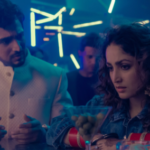The Kashmir militancy that led to unmentionable troubles for Kashmiri Pandits in the early 1990s is all too well-known, especially after its authentic revelations in The Kashmir Files. Horror as a genre (except for horror comedies) is also a generally lucrative, if template-driven, cinematic ‘species.’
But it requires extraordinary mettle, imagination and ability to blend the two in a cinematically-believable manner and come out trumps, both as an anti-terrorist missive (yes, I use that word deliberately) and as a poignant story of horror that does not follow any standard tropes of such films.
Writers Aditya Dhar (URI—The Surgical Strike, Article 370, Dhoom Dhaam) and Aditya Suhas Jambhale) strike high—colossally high!—with this fabulous saga of social import as well with this story of a ‘haunted’ house. A committed (Muslim) police officer, DSP Ridwaan Sayyed (Manav Kaul) comes to live there with his wife Gulnaar (Bhasha Sumbli), son Ayaan (Rohaan Singh), daughter Noorie (Arista Mehta). The house has a Muslim caretaker, Iqbal (Khurshid Mir).
Ridwaan is posted to Baramulla, a somber, forlorn, depressing part of Kashmir, when Shoaib, the son of a politician (Mir Sarwar) gets kidnapped, that too when he volunteers to be a part of a roadside ‘magic show’ in which the subject is supposed to disappear (temporarily) for the trick! Before that, Shoaib is attracted to a solitary white lotus flower amidst the desolation of cloud and snow. This flower is spotted later on multiple occasions like a metaphor!
The magician is an obvious primary suspect, but things take a deeper turn when more children are kidnapped. Each time a child disappears (from school, open ground or wherever), a tuft of his or her hair is found. Meanwhile, Ridwaan’s family hears strange noises in their home and queer things begin to happen, along with the servant’s strange behavior. And gradually, we come to know of the backstory of the house and what had happened there three decades ago.
Soon, it is also clear that it is spirits that are at work, both in Ridwaan’s home and in the kidnappings. So, are they well-intentioned or malevolent? Meanwhile, Ridwaan has to deal with stone-pelters and other anti-social and criminal activists. The final denouement, also involving the principal of the local school, Zainab (Neelofer Hamid), is not scary but deeply emotional and scarring for the viewer, who will take back from the film a story of Hindu-Muslim harmony that stood out even as the Kashmiri Pandits were either forced to leave, or were mercilessly given the options of ‘Convert or Die!”
Atmospheric, ominous and heart-wrenching as the situations arise, Baramulla is not something you will forget after the movie is over (I watched it at a special screening and its plotline, thematic aim and brilliance engulfed me for hours later and still does affect me when I think of the film)!
As the producer, Aditya Dhar, a Kashmiri, told me in a brief interaction that his core idea arose from the fact that he knows of several Muslim friends and their families who are (or were) hardcore nationalists, while the story is developed by a Maharashtrian filmmaker based in Goa, who makes films he strongly believes in—Aditya Suhas Jambhale of Article 370 fame. Jambhale has won National awards for his short films and has helmed a poignant story on Partition named Amritsar Junction, also a short.
The passion, the commitment and the simultaneous desire to excel while following a message film can be seen in every frame. The film was shot in authentic locations and with VFX used only when strictly (and ‘supernaturally’!) needed in 22 days at sub-zero temperatures. Additional heroes are the cinematographer, Arnold Fernandes, and the editor, Shivkumar V. Panicker.
The only avoidable angle in the story (according to me) was the backstory of the Ridwaan and his daughter. Why must all dedicated cops and agents have traumatic pasts, come film or web series?
The background score by Clinton Cerejo and Bianca Gomes under the name of Shor Police is competent and mood-oriented, while production designer Monica Balsara and action director Vicky Arora come up trumps, especially the former, in their respective departments.
Manav Kaul is surpassingly brilliant as Ridwaan, etching every shade of his character’s palette with superbly authentic strokes and flourishes. This is one role no one else, arguably, among existing actors, could have done as well. Bhasha Sumbli, best known in her limited ouevre for her standout role in The Kashmir Files, is excellent as Gulnaar, his wife, who is also a concerned mother and comes across as a strong and progressive-thinking woman in the climax.
The Sayyed kids, played by Arista Mehta (especially) and Rohaan Singh are adorable. Neelofer Hamid as Zainab, Vikas Shukla as Shaukat and the actors playing the Saprus, along with all the kids are efficient.
However, the true hero of this film is Aditya Suhas Jambhale. From concept to execution, every aspect of the film is sheer innovative and impassioned genius. Nothing less than full marks for this one will do justice. This is true-blue Hindi or Indian cinema at its best!
Rating: *****
Netflix presents Jio Studios’ and B62 Productions’ Baramulla Produced by: Jyoti Deshpande, Aditya Dhar & Lokesh Dhar Directed by: Aditya Suhas Jambhale Written by: Aditya Dhar, Aditya Suhas Jambhale & Monal Thakkar Music: Shor Police Starring: Mana Kaul, Bhasha Sumbli, Neelofar Hamid, Arista Mehta, Rohaan Singh, Masoom Mumtaz Khan, Ashwini Koul, Vikas Shukla, Mir Sarwar, Priyank Tatariya, Madan Nazneen, Kiara Khanna, Shahid Latief, Sanjay Suri, Ahmed Ishaq & others


![Baramulla—Manav Kaul[1]](https://southasianherald.com/wp-content/uploads/2025/11/Baramulla—Manav-Kaul1-1170x599.jpg)



